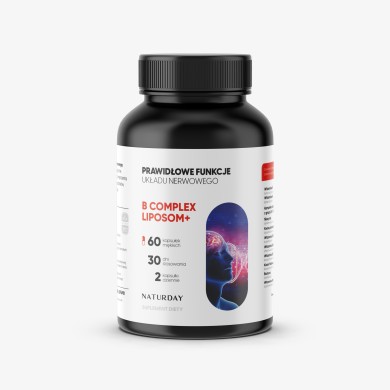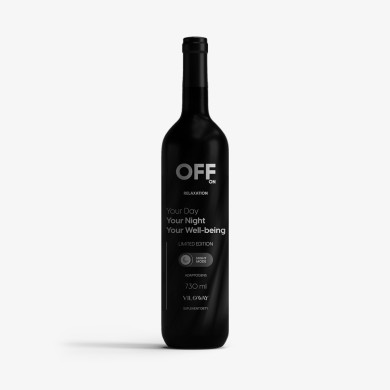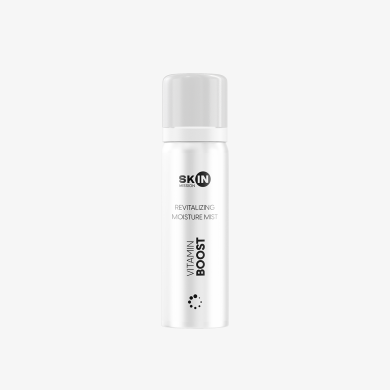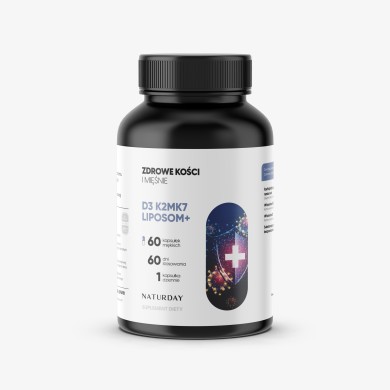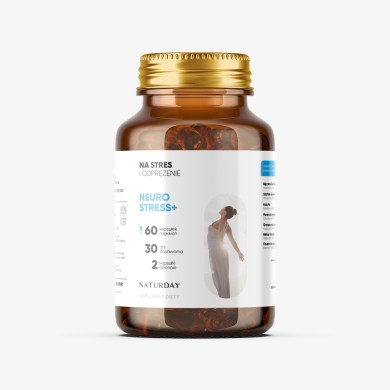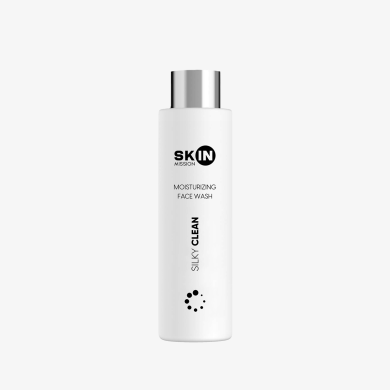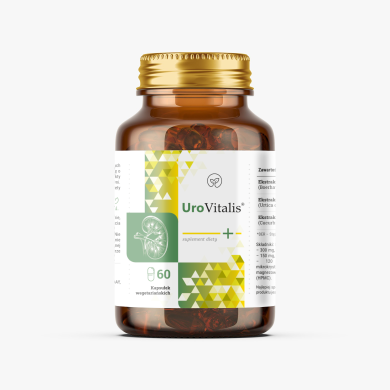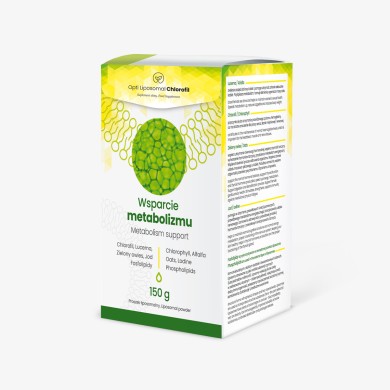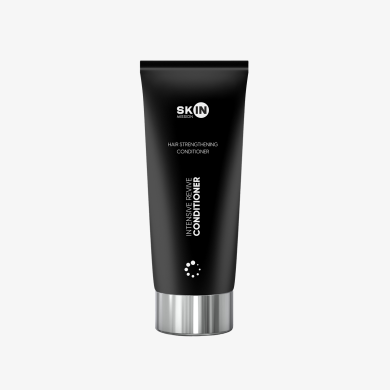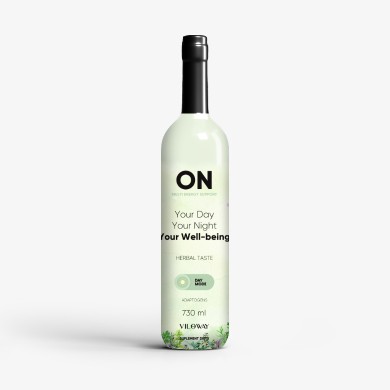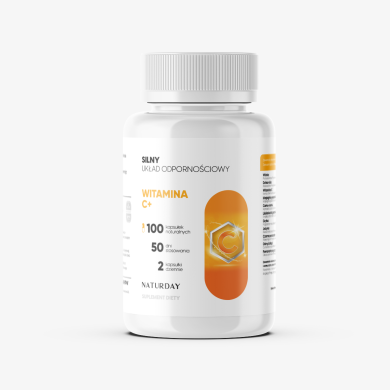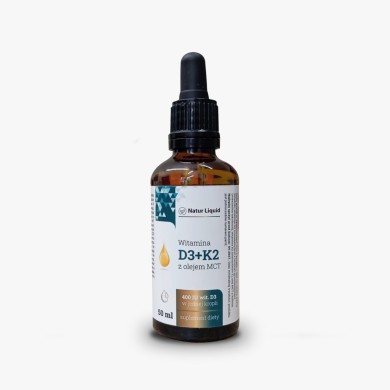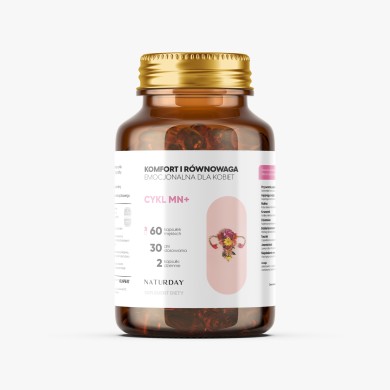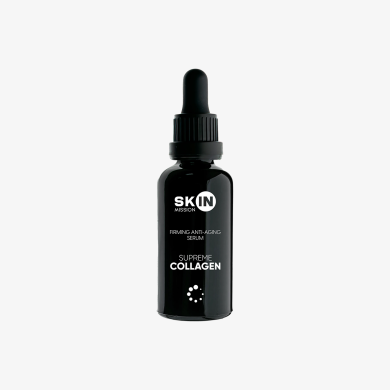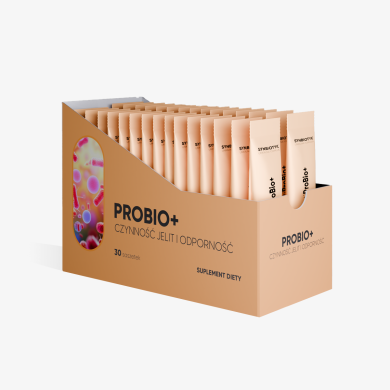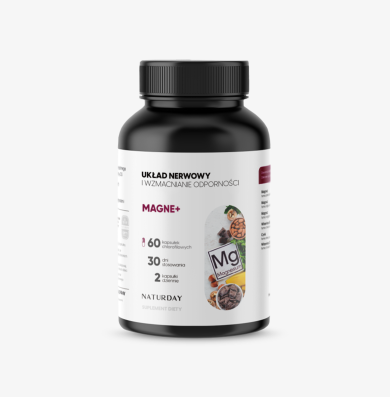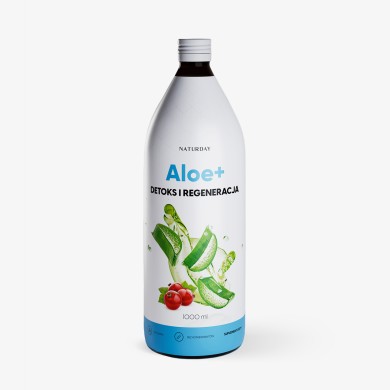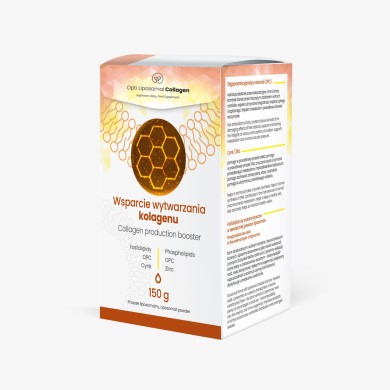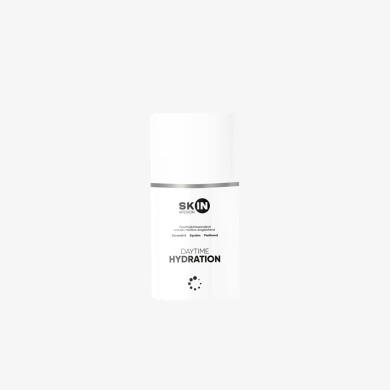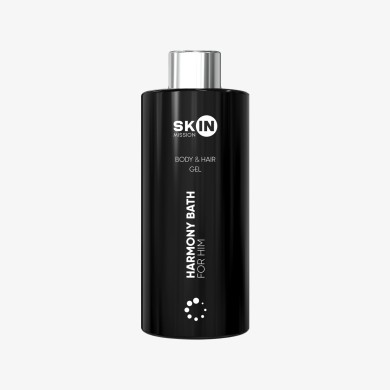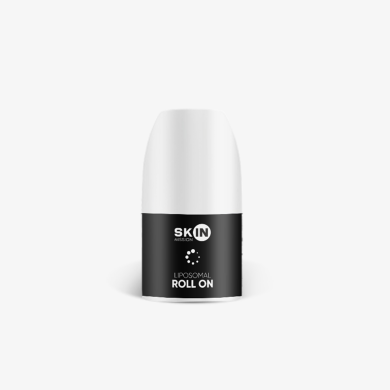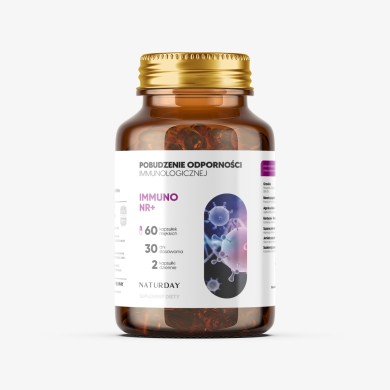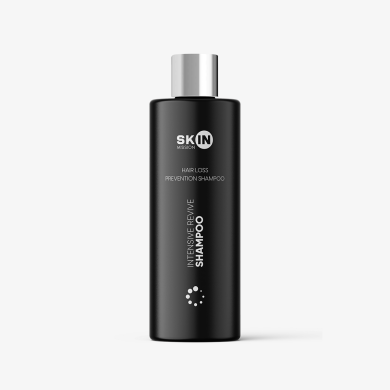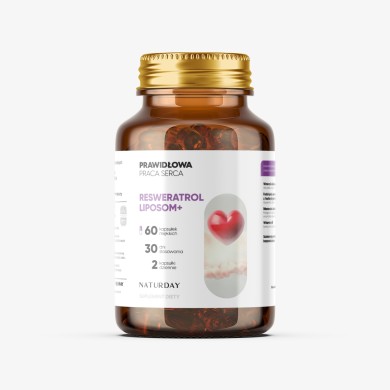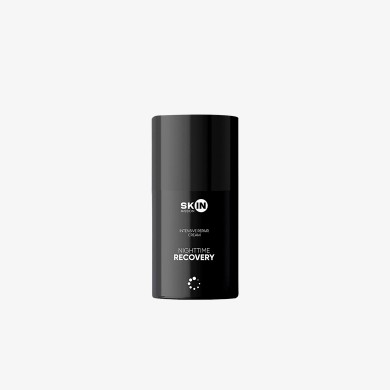- Detox and renewal through natural body cleansing, removing toxins and heavy metals.
- Boosts resistance to bacterial and viral infections thanks to its richness in vitamins and minerals.
- Improves digestion and soothes inflammation in the stomach and intestines, preventing constipation and bloating.
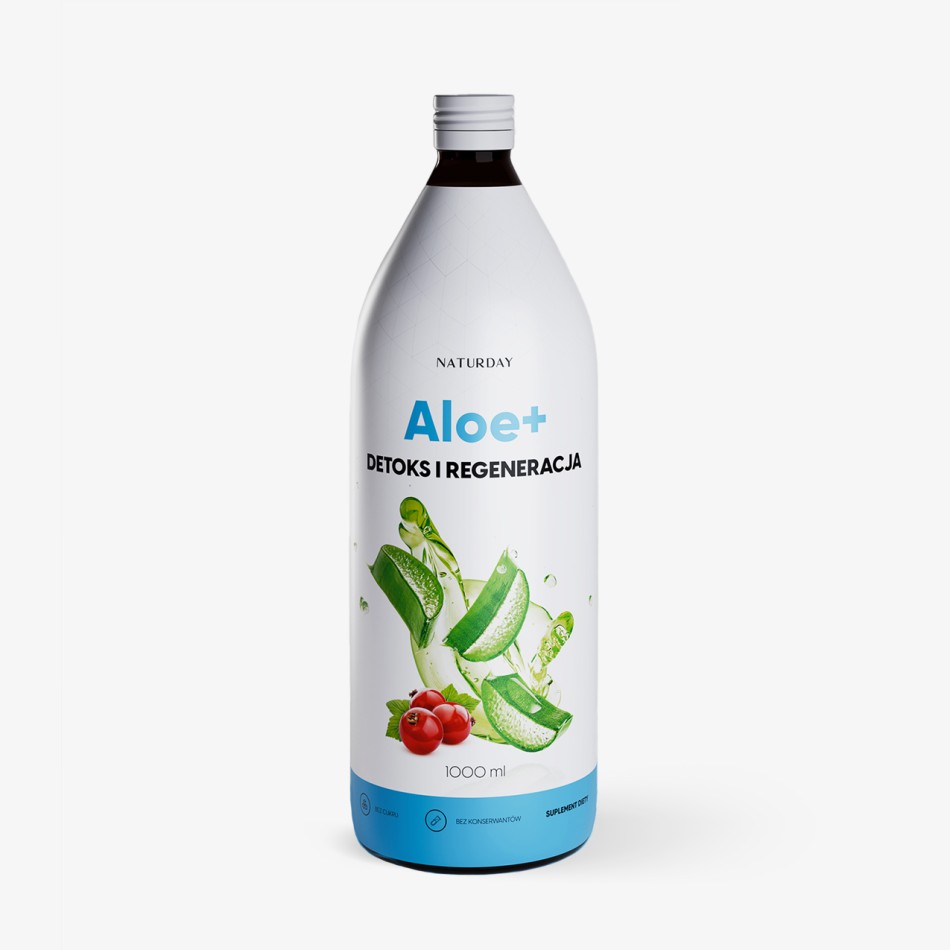
1 tablespoon 3 times a day, drink with water.
Do not exceed the recommended daily serving. Maintaining proper health requires a balanced diet and a healthy lifestyle.
People diagnosed with type II diabetes can consume Aloe+ without the risk of hypoglycemic disturbances.
The product is intended for adults.
Content of ingredients in a daily serving - 3 tablespoons:
- Aloe vera inner gel juice, fiber-free (Aloe vera Folium Succus sine Fiber) DER 4.6:1 - 36 mg
- Wild rose fruit juice (Rosa canina Fructus Succus) DER 4:1 - 9 ml
Antioxidant substance: ascorbic acid.
After opening store in the refrigerator, out of the reach of small children.
After opening the juice should be consumed within 30 days.
Hypersensitivity to product ingredients.
Do not consume for an extended period of time without consulting a doctor.
People diagnosed with type II diabetes can consume Aloe+ without the risk of hypoglycemic disorders.
The product is intended for adults.
The product is not recommended for pregnant and breastfeeding women.
Aloe+
is for you if:
- You are looking for a natural way to detoxify your body.
- You need support in relieving inflammation.
- You have digestive issues and need natural relief.
- You want to support your heart and circulatory system.
- You desire to naturally boost your immunity.
Indications supported by Aloe+ ingredients
Leaky gut is a condition in which the intestinal cells are damaged, leading to increased intestinal permeability and the passage of toxins and bacteria into the body
Gastritis is a condition in which the gastric mucosa is damaged by various etiological factors, leading to an inflammatory response.
Cholangitis is an inflammation of the bile ducts, which can lead to pain in the upper right abdomen, fever and jaundice.
Dyspepsia, also known as indigestion, is a collective term for discomforts related to the digestive system, such as stomach pain, a feeling of fullness, bloating, heartburn, nausea and belching. It can be caused by stress, an unhealthy diet, stomach diseases, or gastroesophageal reflux disease.
Oliguria is a condition in which urine output is significantly reduced, typically below 400 ml per day in an adult. It can be caused by dehydration, kidney diseases, heart failure, infections, urinary tract injuries or metabolic disorders.
Peristalsis is the rhythmic contraction of muscles in the walls of the intestines that enables the movement of food through the digestive system. It is essential for digestion and the absorption of nutrients.
Obesity is a condition in which excess body fat exceeds healthy limits, potentially leading to health problems. It is often the result of poor diet, lack of physical activity, and genetics. Obesity increases the risk of heart disease, diabetes and hypertension.
Weight loss is the process of reducing body mass, usually through a reduction in calorie intake, increased physical activity, and changes in eating habits, aimed at improving health and body shape.
Hypochlorhydria is a condition in which the secretion of hydrochloric acid in the stomach is too low. It can lead to digestive problems, bloating, a sense of fullness, and a weakened immune system.
Seborrhea is the excessive production of sebum (oil), leading to oily skin, particularly on the face, scalp and back. It can be a symptom of skin conditions such as seborrheic dermatitis and may also result from stress, hormonal changes or diet.
Intestinal colic is a sudden, intense abdominal pain caused by intestinal cramps. It can result from bloating, constipation, infections or food intolerances. The pain typically comes in waves and is accompanied by a feeling of fullness.
Gallstones is a condition in which stones form in the gallbladder, potentially blocking the bile ducts, leading to pain, inflammation or infections.
Influenza is a viral respiratory infection characterized by fever, cough, muscle aches, headaches, fatigue and chills. It spreads through droplets and can lead to complications.
Diabetes is a disorder of glucose metabolism. Type 1 diabetes is an autoimmune disease in which the pancreas stops producing insulin, requiring insulin administration. Type 2 diabetes is insulin resistance, often associated with obesity and an unhealthy lifestyle.
Cancer is the uncontrolled growth of cells in the body, leading to the formation of tumors. It can be benign (non-cancerous) or malignant. The latter, known as carcinoma, has the ability to spread to other parts of the body.
Diarrhea is a condition characterized by frequent, watery stools, usually associated with gastrointestinal problems. It can result from infections, food poisoning, stress or chronic diseases.
Angina (pharyngitis) is a bacterial or viral infection that causes pain, redness and swelling of the throat, along with difficulty swallowing.
Improving skin quality through the use of nourishing and building substances. It is an excellent complement to daily skincare.
Skin regeneration is the process of rebuilding and repairing the skin, improving its appearance, elasticity and hydration. Skin regeneration can be supported through moisturizing, nourishing the skin from within and using skincare products with active ingredients.
Mature skin shows signs of aging, such as loss of elasticity, the appearance of wrinkles, sagging and dryness. It is often also accompanied by pigmentation spots and a decrease in firmness.
Nausea is an unpleasant feeling of needing to vomit, often occurring as a symptom of various illnesses and conditions.
A rash is a skin change that can appear as spots, hives, blisters or redness. It can be caused by an allergy, infection, skin conditions or a reaction to medication. It is often accompanied by itching.
Hives are an allergic reaction characterized by red, itchy welts on the skin that resemble the marks left by a nettle burn. It can be caused by an allergy, stress or an infection.
Frequent urination is a condition in which a person urinates more often than usual, which can be caused by urinary tract infections, diabetes, bladder problems or excessive fluid intake.
Digestive problems are discomforts such as abdominal pain, bloating, heartburn, constipation, or diarrhea.
Gingivitis is a condition in which the gums become red, swollen and bleed.
Arthritis, or inflammation of the joints, is a group of diseases that cause pain, stiffness and swelling in the joints. It can result from inflammation, joint damage, infections or autoimmune diseases.
Heartburn - a painful burning sensation that the patient typically locates behind the breastbone, often described as a "burning" in the esophagus.
Colitis is an inflammation of the mucous membrane of the large intestine, which is characterized by abdominal pain, diarrhea, bleeding and fever.
Gastrointestinal infection is a condition caused by bacteria, viruses, or parasites. It is characterized by diarrhea, vomiting, abdominal pain, and fever.
Bloating is a feeling of fullness, tension, and distension in the abdomen, resulting from the excessive accumulation of gas in the digestive tract. It can be caused by an unhealthy diet, stress, digestive disorders, food intolerances or intestinal diseases
Reflux is a condition in which stomach contents flow back into the esophagus, causing heartburn, a burning sensation in the chest and sometimes pain. It can lead to damage to the esophageal lining and in the case of chronic reflux it can develop into gastroesophageal reflux disease (GERD).
Cholecystitis is an inflammation of the gallbladder, most commonly caused by gallstones. It is characterized by pain in the upper right quadrant of the abdomen, fever, nausea and vomiting.
Osteoporosis is a condition characterized by the weakening of bone structure, leading to increased fragility. It results from bone mass loss, with the main risk factors being age, lack of physical activity, a calcium-deficient diet and hormonal changes, especially after menopause.
Swelling is the accumulation of excess fluid in the body’s tissues, causing them to become puffy. Swelling most commonly occurs in the legs, arms or face and can be a result of injuries, infections, heart, kidney or liver diseases.
Hypothyroidism is a condition in which the thyroid gland does not produce enough hormones. It is characterized by symptoms such as fatigue, weight gain, depression and cold intolerance. Treatment with thyroid hormones is necessary to manage the condition.
Gallbladder colic is a sudden, sharp pain in the upper right abdomen, caused by a blockage of the bile ducts, most often due to gallstones. It is accompanied by nausea, vomiting, and a feeling of fullness.
Coughing is a defensive reflex of the body aimed at clearing the airways of impurities, mucus or foreign objects. It can be dry or productive and its causes may include infections, allergies or lung diseases.
Urinary tract stone disease is a condition in which stones form in the kidneys, ureters, or bladder, which can cause pain, hematuria, and obstruct urine flow.
Gout is a metabolic disorder characterized by the excessive accumulation of uric acid in the body, which leads to the formation of crystals in the joints, causing intense pain and inflammation.
Autoimmune diseases are conditions in which the immune system mistakenly attacks the body’s own cells and tissues, recognizing them as foreign. These diseases can lead to chronic inflammation and organ damage. Examples include rheumatoid arthritis, multiple sclerosis, and lupus erythematosus.
Crohn's disease is a chronic inflammation of the intestines that can affect the entire digestive tract. It is characterized by abdominal pain, diarrhea and weight loss.
Asthma is a chronic respiratory disease characterized by inflammation and narrowing of the airways, making breathing difficult. Symptoms include coughing, shortness of breath, wheezing, and chest tightness.
Anemia is a condition in which the number of red blood cells or the concentration of hemoglobin in the blood is below normal, leading to tissue hypoxia. It manifests as fatigue, pallor and weakness.
Dry skin is a condition in which the skin loses an adequate amount of moisture, becoming rough, dull, tight, and may experience flaking, itching, or redness.
Soothing the skin is the process of reducing irritation, redness, itching and discomfort, often using gentle skincare products and dietary supplements that restore its balance.
Gastroenteritis, also known as viral gastroenteritis, is an infection of the digestive tract caused by viruses.
A runny nose is an inflammation of the nasal mucous membrane that leads to excessive mucus production. It can be caused by a viral infection, an allergy, or other irritating factors.
Itching is an unpleasant skin sensation that triggers the urge to scratch or rub. It can result from skin irritation, allergies, skin conditions, insect bites or infections. It is often accompanied by redness or a rash.
Numbness in the limbs is a sensation of loss of feeling, weakness or a "cold" sensation.
Kidney stones are hard, mineral deposits that form in the kidneys. They can cause pain, infections, and urinary problems, especially when they block the urinary tract.
Loss of appetite is a decrease or loss of the desire to eat, which can lead to malnutrition.
Fungal infections are diseases caused by fungi, which can occur on the skin, mucous membranes or in internal organs.
Constipation is the difficulty in passing stool at intervals greater than 3 days.
Enteritis is an inflammation of the walls of the intestines, which can manifest as abdominal pain, diarrhea, vomiting and fever.
Parasitic infections are infections caused by parasites. Symptoms may include abdominal pain, skin changes, fever and weakness, depending on the type of parasite.
Vomiting is the process of forcefully expelling stomach contents through the mouth, often triggered by stomach irritation, infection, poisoning, digestive system disorders or other health factors.
Chronic pancreatitis is a long-lasting inflammation of the pancreas that leads to gradual damage and scarring of pancreatic tissue. Symptoms include abdominal pain, digestive issues, weight loss and diabetes. In advanced stages, it can lead to pancreatic failure.
Skin ulceration is damage to the skin's structure that leads to the formation of an open wound or ulcer. It can result from injuries, infections, chronic diseases (e.g., diabetes, varicose veins), or poor circulation.
Herpes is an infection caused by the herpes simplex virus (HSV), which manifests as painful blisters on the skin or mucous membranes, most commonly around the mouth (oral herpes). The infection is contagious and can recur.
Indigestion (dyspepsia) is a feeling of discomfort in the abdominal area, often associated with pain, bloating, heartburn, or a sense of fullness after eating. It may be related to digestive issues, an improper diet, stress or stomach disorders.
Cirrhosis is a chronic liver disease characterized by liver tissue damage and scarring. It leads to dysfunction of the liver, which can result in liver failure, portal hypertension, and other complications.
Kidney colic is a sharp, intense pain that occurs due to a sudden blockage of the urinary tract, most often caused by kidney stones. The pain radiates from the back to the lower abdomen and is frequently accompanied by nausea and vomiting.
Tooth decay is a disease in which the enamel of the tooth undergoes demineralization, leading to its damage. It occurs as a result of acids produced by bacteria that break down sugars from food.
Hyperlipidemia is a condition in which there are elevated levels of lipids (fats) in the blood, such as cholesterol and triglycerides, which increases the risk of cardiovascular diseases.
Detox is the process of cleansing the body from toxins, harmful substances or excess substances that may negatively impact health.
Stomach and duodenal ulcers are sores on the mucous membrane of these organs, often caused by an infection with *Helicobacter pylori* bacteria or excessive use of pain medications. They are characterized by pain in the upper abdomen, heartburn, and nausea.
Bulimia is an eating disorder characterized by episodes of binge eating, followed by attempts to get rid of the food (e.g., vomiting, using laxatives) in order to prevent weight gain.
Anorexia is an eating disorder characterized by extreme restriction of food intake, a fear of gaining weight and a distorted body image.
Magnesium deficiency is a condition where the magnesium level in the body is too low, which can lead to muscle cramps, weakness, fatigue, irregular heartbeat, and concentration problems.
Skin hydration – using products that help maintain the proper moisture levels in the skin, such as hyaluronic acid, collagen, vitamins (A, E, C), and minerals. Regular use of these can improve the skin's condition, elasticity and hydration.
Dry skin is a condition in which the skin loses its natural moisture, becoming rough, tight, and may peel or crack.
Abdominal pain is a condition that can result from various causes, such as digestive system issues, infections, stress or diseases of internal organs.
An allergy is an excessive immune system reaction to substances that are harmless to most people (e.g., pollen, dust, food). Symptoms can include itching, rashes, a runny nose, coughing, or shortness of breath.
Eczema is an inflammatory skin condition characterized by itching, redness, dryness and cracking of the skin. It can be caused by allergies, stress or other environmental factors.
Menstrual cramps are abdominal pains that occur in many women during their menstrual cycle. They are caused by uterine contractions, which help expel the uterine lining.
Snoring is most often caused by the looseness or narrowing of the airways, which increases the risk of sleep apnea.
Excessive sweating is a condition in which the body produces more sweat than necessary to regulate body temperature.
Aphthae are painful, small ulcers that appear on the mucous membrane of the mouth. They can be caused by stress, injuries, infections, vitamin deficiencies, or autoimmune diseases.
What do our recipients say about Aloe+?
Do you have Aloe+?
Describe your experience with the product, add a review and help others choose.
Aloe vera is an extremely versatile plant that has helped me naturally detoxify my body. Its cleansing properties promote the elimination of toxins, which has a positive effect on the functioning of the digestive system and overall well-being. With regular consumption of aloe vera juice, I have noticed improved skin condition, more lightness in the body and increased energy. What's more, aloe vera supports liver function and has anti-inflammatory properties, making it an ideal ingredient for a cleansing diet. I recommend it to anyone looking for a gentle and natural way to detoxify!
Aloe vera is an extremely versatile plant that has helped me naturally detoxify my body. Its cleansing properties promote the elimination of toxins, which has a positive effect on the functioning of the digestive system and overall well-being. With regular consumption of aloe vera juice, I have noticed improved skin condition, more lightness in the body and increased energy. What's more, aloe vera supports liver function and has anti-inflammatory properties, making it an ideal ingredient for a cleansing diet. I recommend it to anyone looking for a gentle and natural way to detoxify!

Aloe + brilliant taste combined with rosehip for constipation bloating, weight loss and for immunity this product is multi-tasking, I liked it from the first use
Aloe + brilliant taste combined with rosehip for constipation bloating, weight loss and for immunity this product is multi-tasking, I liked it from the first use

The aloe vera that Viloway offers is meeting my expectations 100%. Analyzing the market, I have not met an equally good product ! This is simply going to the highest level ! Those who have had the opportunity to test other aloe vera will see a dramatic difference after introducing this divine liquid into the diet! Great price, top product on a global scale, what to want more
The aloe vera that Viloway offers is meeting my expectations 100%. Analyzing the market, I have not met an equally good product ! This is simply going to the highest level ! Those who have had the opportunity to test other aloe vera will see a dramatic difference after introducing this divine liquid into the diet! Great price, top product on a global scale, what to want more

Aloe worthy of attention, great combination with rosehip gives a nice aftertaste in addition I feel the difference after eating. I don't have unpleasant flatulence and my mood has thus improved
Aloe worthy of attention, great combination with rosehip gives a nice aftertaste in addition I feel the difference after eating. I don't have unpleasant flatulence and my mood has thus improved

Flatulence, constipation, is not a problem if I take this sensational aloe vera additionally it does not retain water in the body, I do not feel swollen, my skin becomes elastic , additionally great during the period of losing pounds
Flatulence, constipation, is not a problem if I take this sensational aloe vera additionally it does not retain water in the body, I do not feel swollen, my skin becomes elastic , additionally great during the period of losing pounds

The unique composition and quality of Aloe + makes my family highly recommend this product. 👌
The unique composition and quality of Aloe + makes my family highly recommend this product. 👌

Aloe vera has had a great impact on how I feel. Cleansing the body is essential. I feel lighter and recommend doing such a detox.
Aloe vera has had a great impact on how I feel. Cleansing the body is essential. I feel lighter and recommend doing such a detox.

I recommend, it helps me with intestinal problems .
I recommend, it helps me with intestinal problems .

This is what your predecessors asked us about
Frequently Asked Questions
Do you have any questions?
You are supported by our service office and experts.
From Monday to Friday 8:00 - 16:00.
